The New Coke Debacle: An Analysis of Coca-Cola's Brand Failure
VerifiedAdded on 2019/09/24
|12
|2235
|148
Report
AI Summary
This report provides an in-depth analysis of the Coca-Cola brand failure, specifically focusing on the introduction of New Coke in 1985. It examines the factors that contributed to the failure, highlighting the importance of customer loyalty, brand image, and the emotional connection consumers had with the original Coca-Cola formula. The report discusses the marketing strategies employed, the problem definition, and the research methodology used, including primary and secondary data sources, questionnaires, and statistical analysis. It explores factors influencing brand loyalty such as satisfaction, trust, brand image, commitment, and word of mouth. The research objective was to understand the dimensions of brand loyalty that were overlooked by Coca-Cola management. The findings reveal that the majority of customers preferred the original Coca-Cola, emphasizing the significance of brand perception. The report concludes with recommendations for the company, including focusing on brand perception, avoiding the imitation of competitors' strategies, and the importance of market research. The report underscores that the marketing is much more than the product itself.
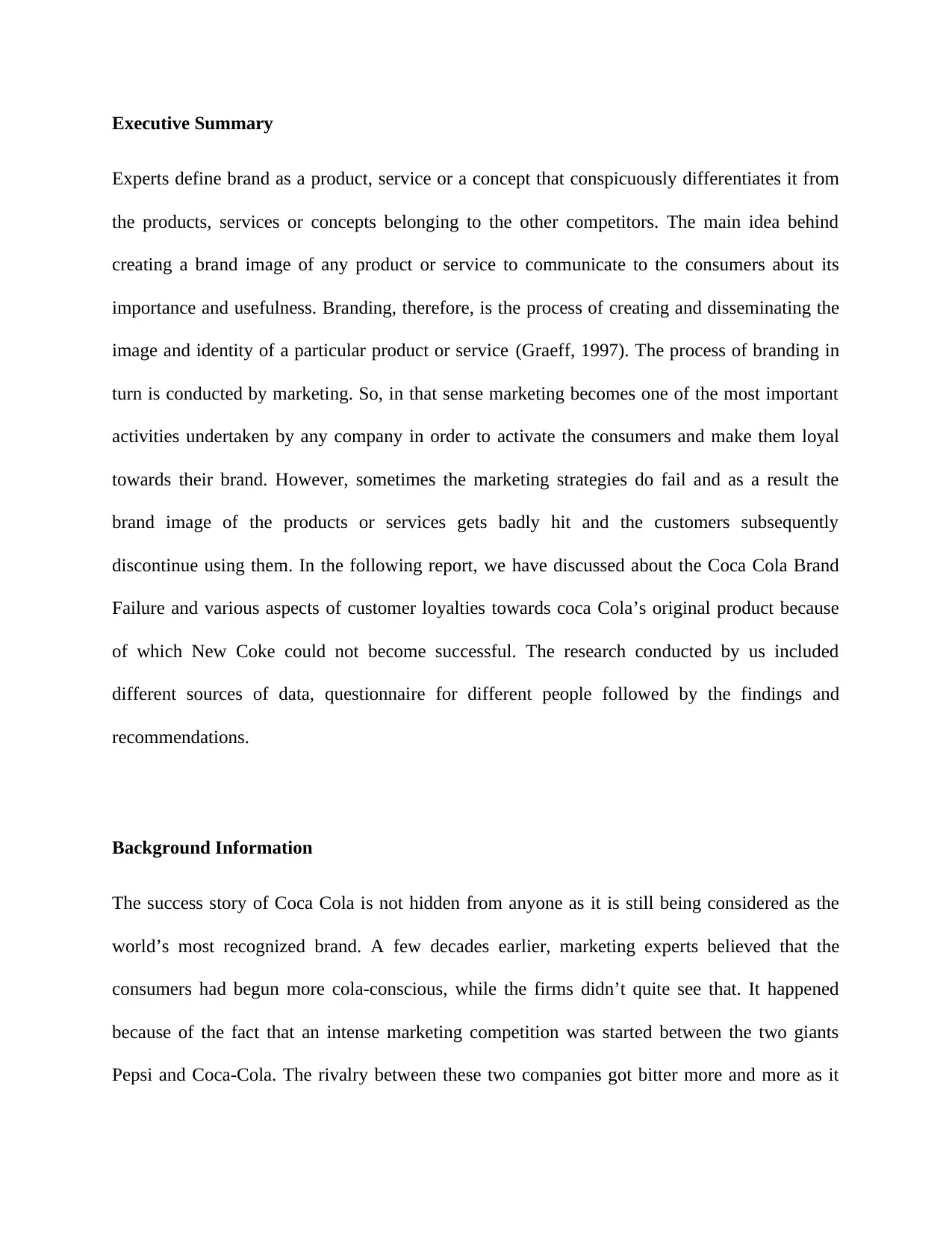
Executive Summary
Experts define brand as a product, service or a concept that conspicuously differentiates it from
the products, services or concepts belonging to the other competitors. The main idea behind
creating a brand image of any product or service to communicate to the consumers about its
importance and usefulness. Branding, therefore, is the process of creating and disseminating the
image and identity of a particular product or service (Graeff, 1997). The process of branding in
turn is conducted by marketing. So, in that sense marketing becomes one of the most important
activities undertaken by any company in order to activate the consumers and make them loyal
towards their brand. However, sometimes the marketing strategies do fail and as a result the
brand image of the products or services gets badly hit and the customers subsequently
discontinue using them. In the following report, we have discussed about the Coca Cola Brand
Failure and various aspects of customer loyalties towards coca Cola’s original product because
of which New Coke could not become successful. The research conducted by us included
different sources of data, questionnaire for different people followed by the findings and
recommendations.
Background Information
The success story of Coca Cola is not hidden from anyone as it is still being considered as the
world’s most recognized brand. A few decades earlier, marketing experts believed that the
consumers had begun more cola-conscious, while the firms didn’t quite see that. It happened
because of the fact that an intense marketing competition was started between the two giants
Pepsi and Coca-Cola. The rivalry between these two companies got bitter more and more as it
Experts define brand as a product, service or a concept that conspicuously differentiates it from
the products, services or concepts belonging to the other competitors. The main idea behind
creating a brand image of any product or service to communicate to the consumers about its
importance and usefulness. Branding, therefore, is the process of creating and disseminating the
image and identity of a particular product or service (Graeff, 1997). The process of branding in
turn is conducted by marketing. So, in that sense marketing becomes one of the most important
activities undertaken by any company in order to activate the consumers and make them loyal
towards their brand. However, sometimes the marketing strategies do fail and as a result the
brand image of the products or services gets badly hit and the customers subsequently
discontinue using them. In the following report, we have discussed about the Coca Cola Brand
Failure and various aspects of customer loyalties towards coca Cola’s original product because
of which New Coke could not become successful. The research conducted by us included
different sources of data, questionnaire for different people followed by the findings and
recommendations.
Background Information
The success story of Coca Cola is not hidden from anyone as it is still being considered as the
world’s most recognized brand. A few decades earlier, marketing experts believed that the
consumers had begun more cola-conscious, while the firms didn’t quite see that. It happened
because of the fact that an intense marketing competition was started between the two giants
Pepsi and Coca-Cola. The rivalry between these two companies got bitter more and more as it
Paraphrase This Document
Need a fresh take? Get an instant paraphrase of this document with our AI Paraphraser
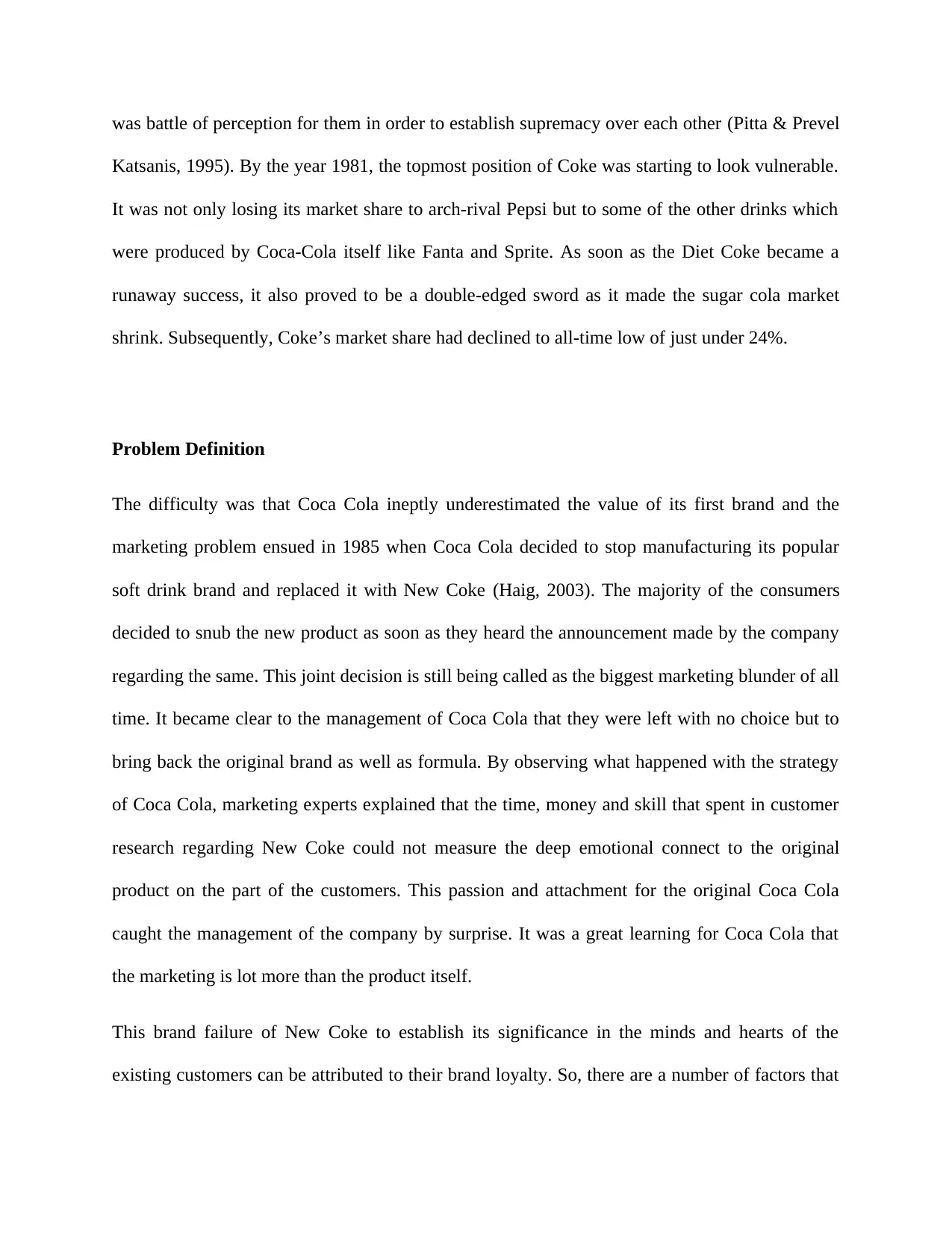
was battle of perception for them in order to establish supremacy over each other (Pitta & Prevel
Katsanis, 1995). By the year 1981, the topmost position of Coke was starting to look vulnerable.
It was not only losing its market share to arch-rival Pepsi but to some of the other drinks which
were produced by Coca-Cola itself like Fanta and Sprite. As soon as the Diet Coke became a
runaway success, it also proved to be a double-edged sword as it made the sugar cola market
shrink. Subsequently, Coke’s market share had declined to all-time low of just under 24%.
Problem Definition
The difficulty was that Coca Cola ineptly underestimated the value of its first brand and the
marketing problem ensued in 1985 when Coca Cola decided to stop manufacturing its popular
soft drink brand and replaced it with New Coke (Haig, 2003). The majority of the consumers
decided to snub the new product as soon as they heard the announcement made by the company
regarding the same. This joint decision is still being called as the biggest marketing blunder of all
time. It became clear to the management of Coca Cola that they were left with no choice but to
bring back the original brand as well as formula. By observing what happened with the strategy
of Coca Cola, marketing experts explained that the time, money and skill that spent in customer
research regarding New Coke could not measure the deep emotional connect to the original
product on the part of the customers. This passion and attachment for the original Coca Cola
caught the management of the company by surprise. It was a great learning for Coca Cola that
the marketing is lot more than the product itself.
This brand failure of New Coke to establish its significance in the minds and hearts of the
existing customers can be attributed to their brand loyalty. So, there are a number of factors that
Katsanis, 1995). By the year 1981, the topmost position of Coke was starting to look vulnerable.
It was not only losing its market share to arch-rival Pepsi but to some of the other drinks which
were produced by Coca-Cola itself like Fanta and Sprite. As soon as the Diet Coke became a
runaway success, it also proved to be a double-edged sword as it made the sugar cola market
shrink. Subsequently, Coke’s market share had declined to all-time low of just under 24%.
Problem Definition
The difficulty was that Coca Cola ineptly underestimated the value of its first brand and the
marketing problem ensued in 1985 when Coca Cola decided to stop manufacturing its popular
soft drink brand and replaced it with New Coke (Haig, 2003). The majority of the consumers
decided to snub the new product as soon as they heard the announcement made by the company
regarding the same. This joint decision is still being called as the biggest marketing blunder of all
time. It became clear to the management of Coca Cola that they were left with no choice but to
bring back the original brand as well as formula. By observing what happened with the strategy
of Coca Cola, marketing experts explained that the time, money and skill that spent in customer
research regarding New Coke could not measure the deep emotional connect to the original
product on the part of the customers. This passion and attachment for the original Coca Cola
caught the management of the company by surprise. It was a great learning for Coca Cola that
the marketing is lot more than the product itself.
This brand failure of New Coke to establish its significance in the minds and hearts of the
existing customers can be attributed to their brand loyalty. So, there are a number of factors that
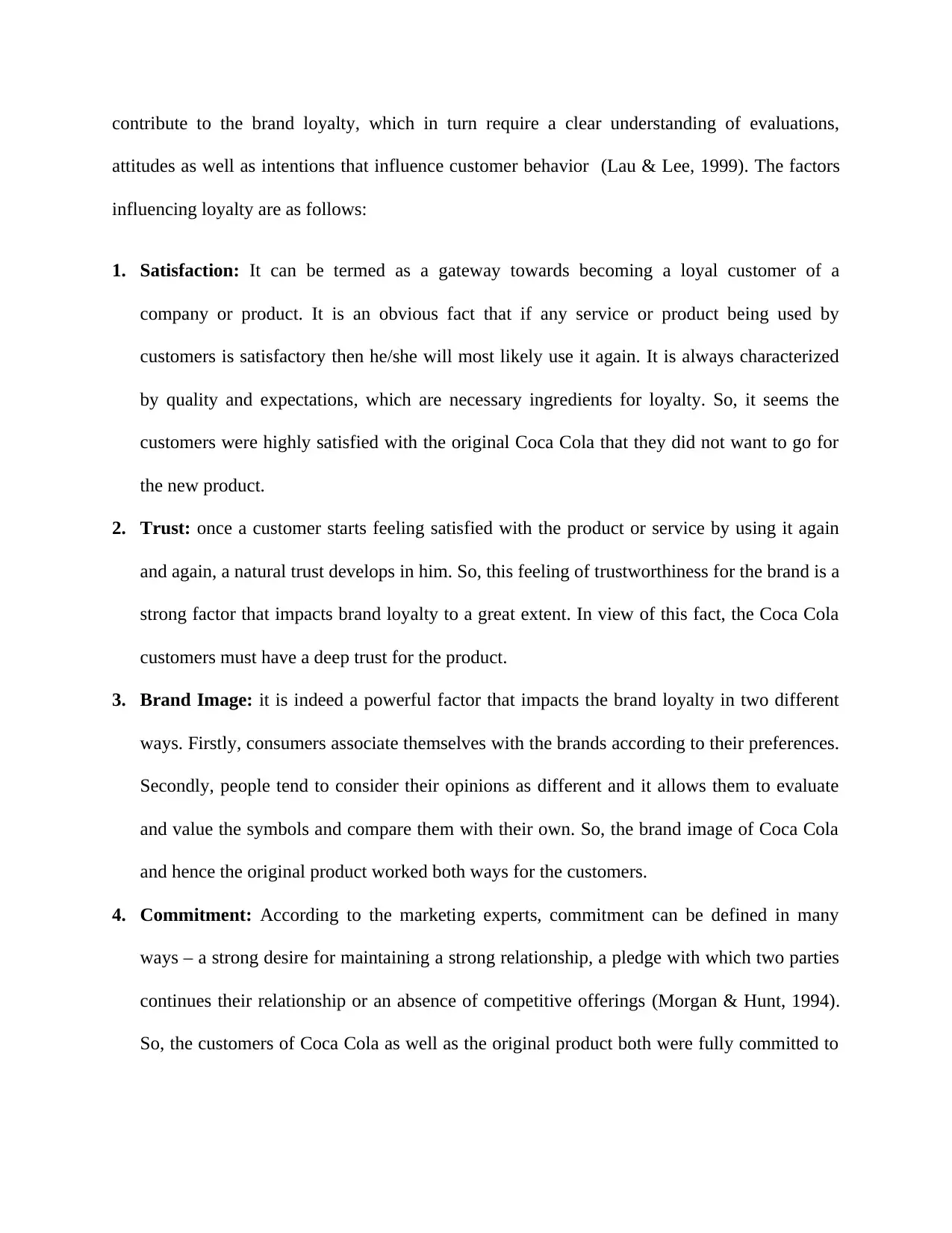
contribute to the brand loyalty, which in turn require a clear understanding of evaluations,
attitudes as well as intentions that influence customer behavior (Lau & Lee, 1999). The factors
influencing loyalty are as follows:
1. Satisfaction: It can be termed as a gateway towards becoming a loyal customer of a
company or product. It is an obvious fact that if any service or product being used by
customers is satisfactory then he/she will most likely use it again. It is always characterized
by quality and expectations, which are necessary ingredients for loyalty. So, it seems the
customers were highly satisfied with the original Coca Cola that they did not want to go for
the new product.
2. Trust: once a customer starts feeling satisfied with the product or service by using it again
and again, a natural trust develops in him. So, this feeling of trustworthiness for the brand is a
strong factor that impacts brand loyalty to a great extent. In view of this fact, the Coca Cola
customers must have a deep trust for the product.
3. Brand Image: it is indeed a powerful factor that impacts the brand loyalty in two different
ways. Firstly, consumers associate themselves with the brands according to their preferences.
Secondly, people tend to consider their opinions as different and it allows them to evaluate
and value the symbols and compare them with their own. So, the brand image of Coca Cola
and hence the original product worked both ways for the customers.
4. Commitment: According to the marketing experts, commitment can be defined in many
ways – a strong desire for maintaining a strong relationship, a pledge with which two parties
continues their relationship or an absence of competitive offerings (Morgan & Hunt, 1994).
So, the customers of Coca Cola as well as the original product both were fully committed to
attitudes as well as intentions that influence customer behavior (Lau & Lee, 1999). The factors
influencing loyalty are as follows:
1. Satisfaction: It can be termed as a gateway towards becoming a loyal customer of a
company or product. It is an obvious fact that if any service or product being used by
customers is satisfactory then he/she will most likely use it again. It is always characterized
by quality and expectations, which are necessary ingredients for loyalty. So, it seems the
customers were highly satisfied with the original Coca Cola that they did not want to go for
the new product.
2. Trust: once a customer starts feeling satisfied with the product or service by using it again
and again, a natural trust develops in him. So, this feeling of trustworthiness for the brand is a
strong factor that impacts brand loyalty to a great extent. In view of this fact, the Coca Cola
customers must have a deep trust for the product.
3. Brand Image: it is indeed a powerful factor that impacts the brand loyalty in two different
ways. Firstly, consumers associate themselves with the brands according to their preferences.
Secondly, people tend to consider their opinions as different and it allows them to evaluate
and value the symbols and compare them with their own. So, the brand image of Coca Cola
and hence the original product worked both ways for the customers.
4. Commitment: According to the marketing experts, commitment can be defined in many
ways – a strong desire for maintaining a strong relationship, a pledge with which two parties
continues their relationship or an absence of competitive offerings (Morgan & Hunt, 1994).
So, the customers of Coca Cola as well as the original product both were fully committed to
⊘ This is a preview!⊘
Do you want full access?
Subscribe today to unlock all pages.

Trusted by 1+ million students worldwide
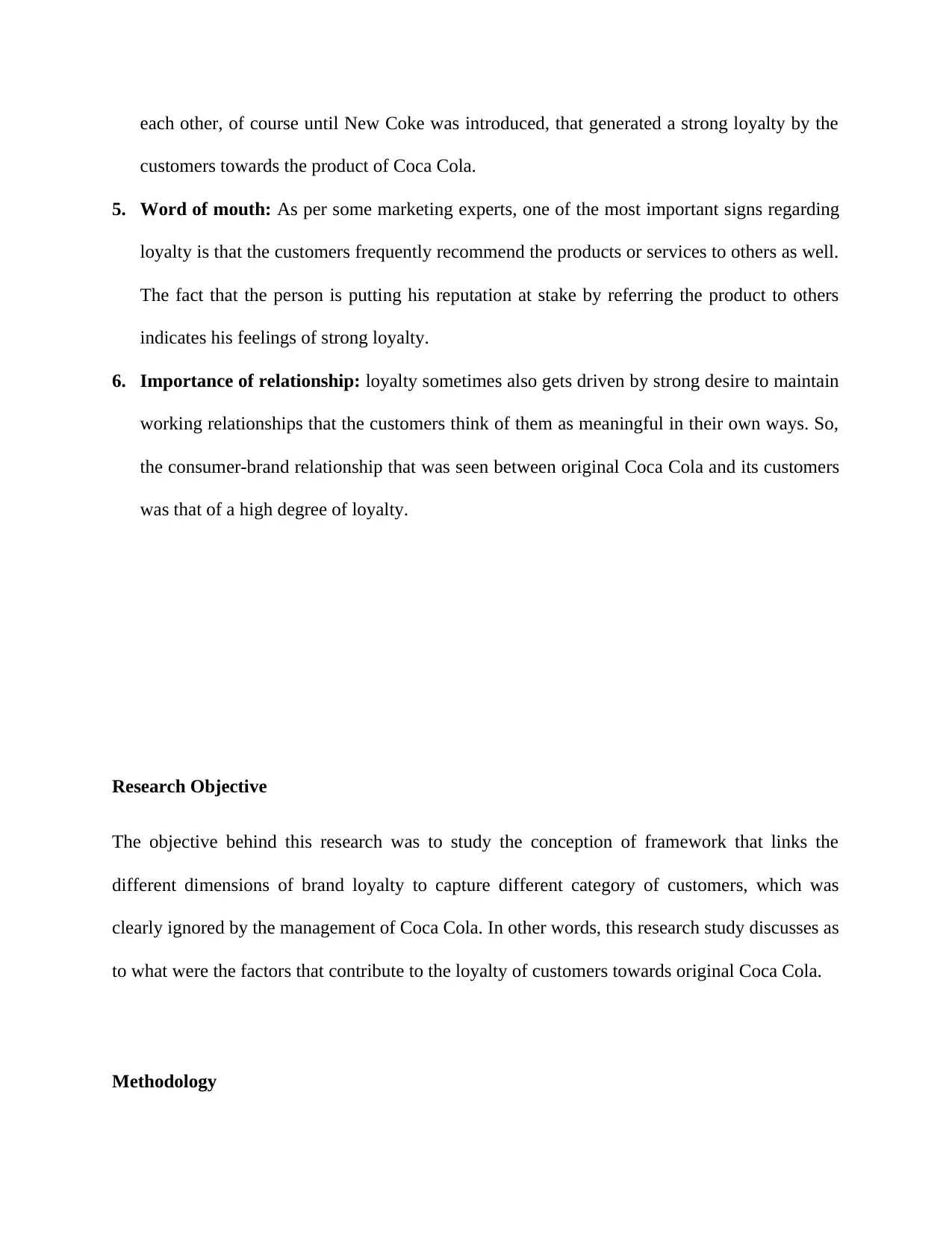
each other, of course until New Coke was introduced, that generated a strong loyalty by the
customers towards the product of Coca Cola.
5. Word of mouth: As per some marketing experts, one of the most important signs regarding
loyalty is that the customers frequently recommend the products or services to others as well.
The fact that the person is putting his reputation at stake by referring the product to others
indicates his feelings of strong loyalty.
6. Importance of relationship: loyalty sometimes also gets driven by strong desire to maintain
working relationships that the customers think of them as meaningful in their own ways. So,
the consumer-brand relationship that was seen between original Coca Cola and its customers
was that of a high degree of loyalty.
Research Objective
The objective behind this research was to study the conception of framework that links the
different dimensions of brand loyalty to capture different category of customers, which was
clearly ignored by the management of Coca Cola. In other words, this research study discusses as
to what were the factors that contribute to the loyalty of customers towards original Coca Cola.
Methodology
customers towards the product of Coca Cola.
5. Word of mouth: As per some marketing experts, one of the most important signs regarding
loyalty is that the customers frequently recommend the products or services to others as well.
The fact that the person is putting his reputation at stake by referring the product to others
indicates his feelings of strong loyalty.
6. Importance of relationship: loyalty sometimes also gets driven by strong desire to maintain
working relationships that the customers think of them as meaningful in their own ways. So,
the consumer-brand relationship that was seen between original Coca Cola and its customers
was that of a high degree of loyalty.
Research Objective
The objective behind this research was to study the conception of framework that links the
different dimensions of brand loyalty to capture different category of customers, which was
clearly ignored by the management of Coca Cola. In other words, this research study discusses as
to what were the factors that contribute to the loyalty of customers towards original Coca Cola.
Methodology
Paraphrase This Document
Need a fresh take? Get an instant paraphrase of this document with our AI Paraphraser
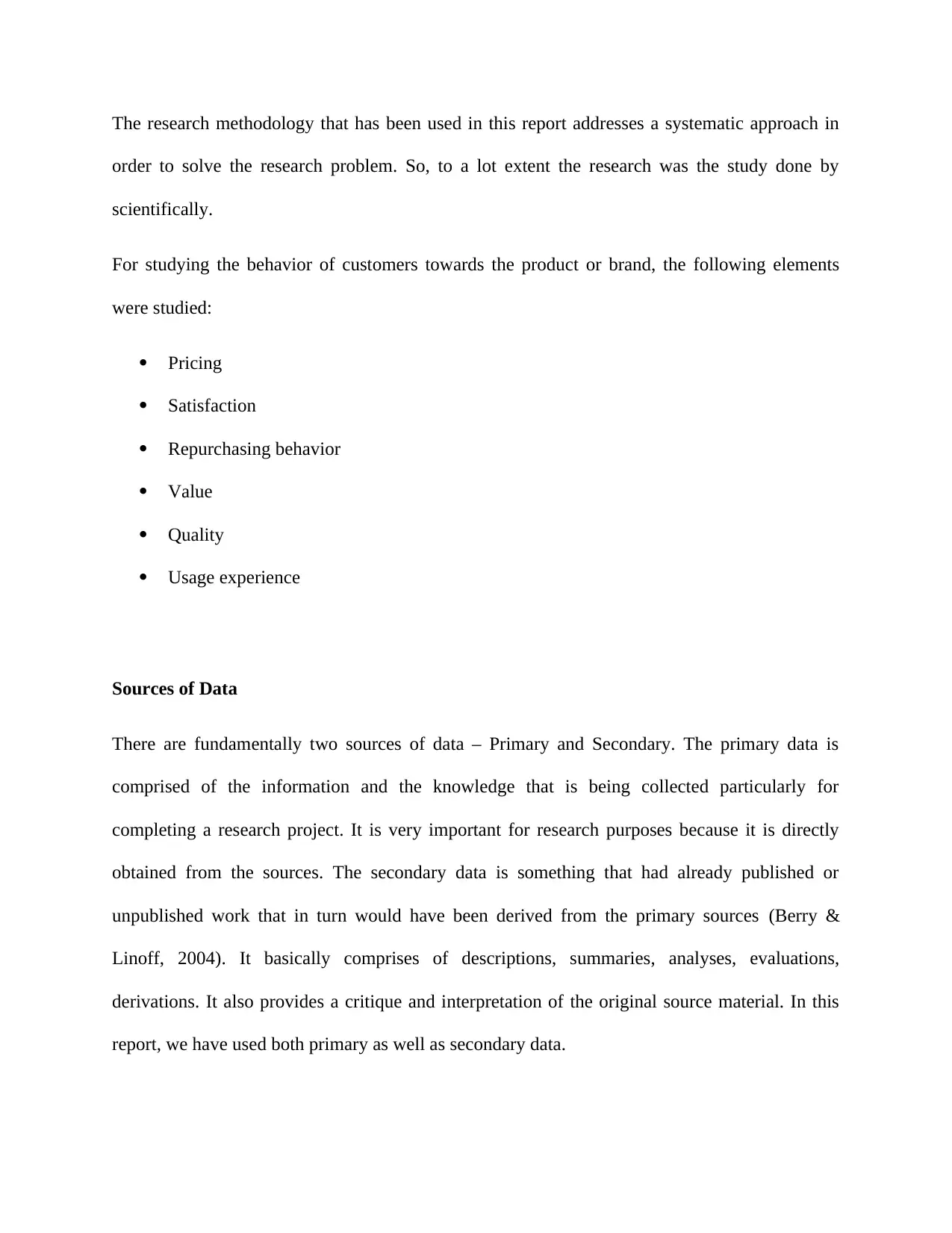
The research methodology that has been used in this report addresses a systematic approach in
order to solve the research problem. So, to a lot extent the research was the study done by
scientifically.
For studying the behavior of customers towards the product or brand, the following elements
were studied:
Pricing
Satisfaction
Repurchasing behavior
Value
Quality
Usage experience
Sources of Data
There are fundamentally two sources of data – Primary and Secondary. The primary data is
comprised of the information and the knowledge that is being collected particularly for
completing a research project. It is very important for research purposes because it is directly
obtained from the sources. The secondary data is something that had already published or
unpublished work that in turn would have been derived from the primary sources (Berry &
Linoff, 2004). It basically comprises of descriptions, summaries, analyses, evaluations,
derivations. It also provides a critique and interpretation of the original source material. In this
report, we have used both primary as well as secondary data.
order to solve the research problem. So, to a lot extent the research was the study done by
scientifically.
For studying the behavior of customers towards the product or brand, the following elements
were studied:
Pricing
Satisfaction
Repurchasing behavior
Value
Quality
Usage experience
Sources of Data
There are fundamentally two sources of data – Primary and Secondary. The primary data is
comprised of the information and the knowledge that is being collected particularly for
completing a research project. It is very important for research purposes because it is directly
obtained from the sources. The secondary data is something that had already published or
unpublished work that in turn would have been derived from the primary sources (Berry &
Linoff, 2004). It basically comprises of descriptions, summaries, analyses, evaluations,
derivations. It also provides a critique and interpretation of the original source material. In this
report, we have used both primary as well as secondary data.
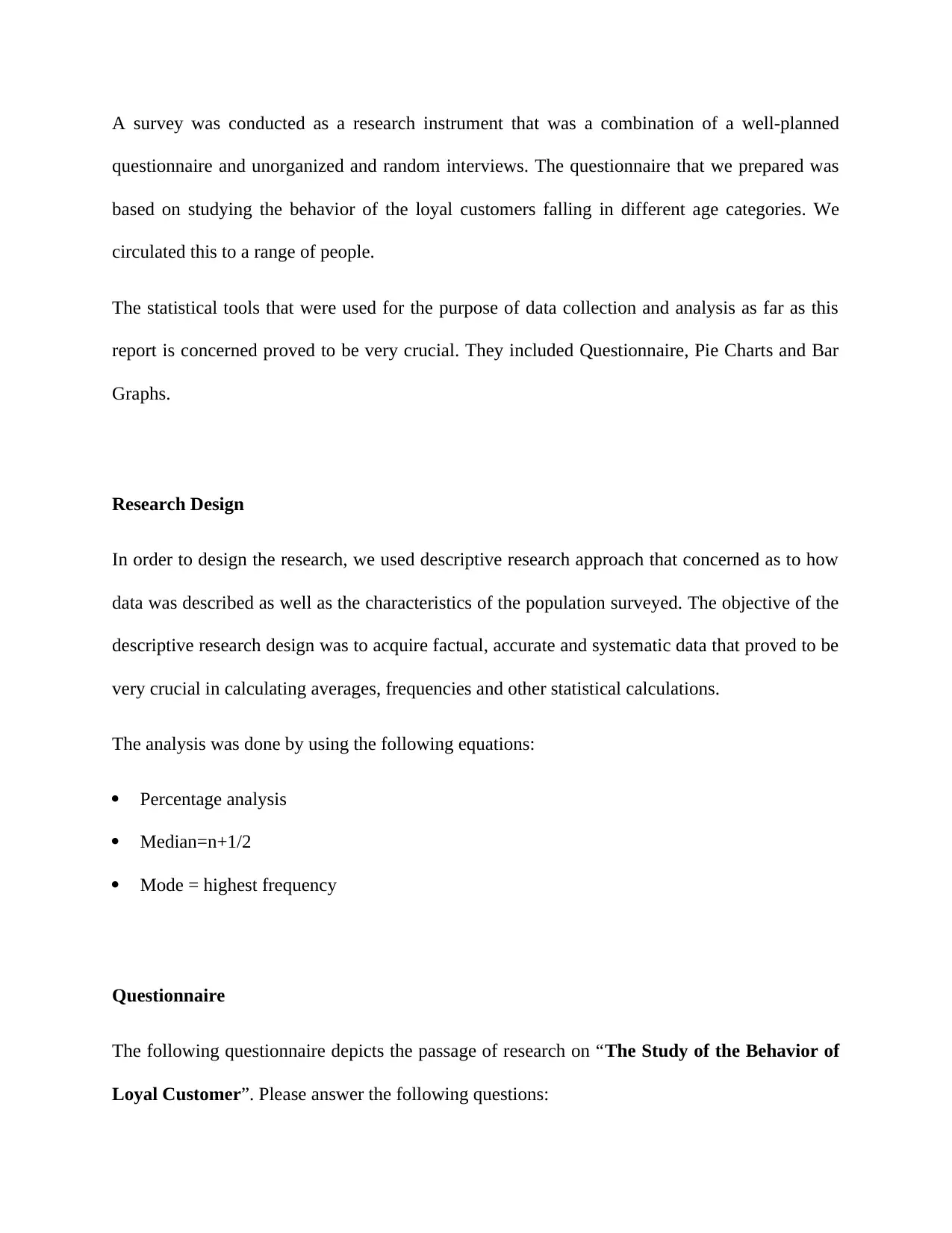
A survey was conducted as a research instrument that was a combination of a well-planned
questionnaire and unorganized and random interviews. The questionnaire that we prepared was
based on studying the behavior of the loyal customers falling in different age categories. We
circulated this to a range of people.
The statistical tools that were used for the purpose of data collection and analysis as far as this
report is concerned proved to be very crucial. They included Questionnaire, Pie Charts and Bar
Graphs.
Research Design
In order to design the research, we used descriptive research approach that concerned as to how
data was described as well as the characteristics of the population surveyed. The objective of the
descriptive research design was to acquire factual, accurate and systematic data that proved to be
very crucial in calculating averages, frequencies and other statistical calculations.
The analysis was done by using the following equations:
Percentage analysis
Median=n+1/2
Mode = highest frequency
Questionnaire
The following questionnaire depicts the passage of research on “The Study of the Behavior of
Loyal Customer”. Please answer the following questions:
questionnaire and unorganized and random interviews. The questionnaire that we prepared was
based on studying the behavior of the loyal customers falling in different age categories. We
circulated this to a range of people.
The statistical tools that were used for the purpose of data collection and analysis as far as this
report is concerned proved to be very crucial. They included Questionnaire, Pie Charts and Bar
Graphs.
Research Design
In order to design the research, we used descriptive research approach that concerned as to how
data was described as well as the characteristics of the population surveyed. The objective of the
descriptive research design was to acquire factual, accurate and systematic data that proved to be
very crucial in calculating averages, frequencies and other statistical calculations.
The analysis was done by using the following equations:
Percentage analysis
Median=n+1/2
Mode = highest frequency
Questionnaire
The following questionnaire depicts the passage of research on “The Study of the Behavior of
Loyal Customer”. Please answer the following questions:
⊘ This is a preview!⊘
Do you want full access?
Subscribe today to unlock all pages.

Trusted by 1+ million students worldwide
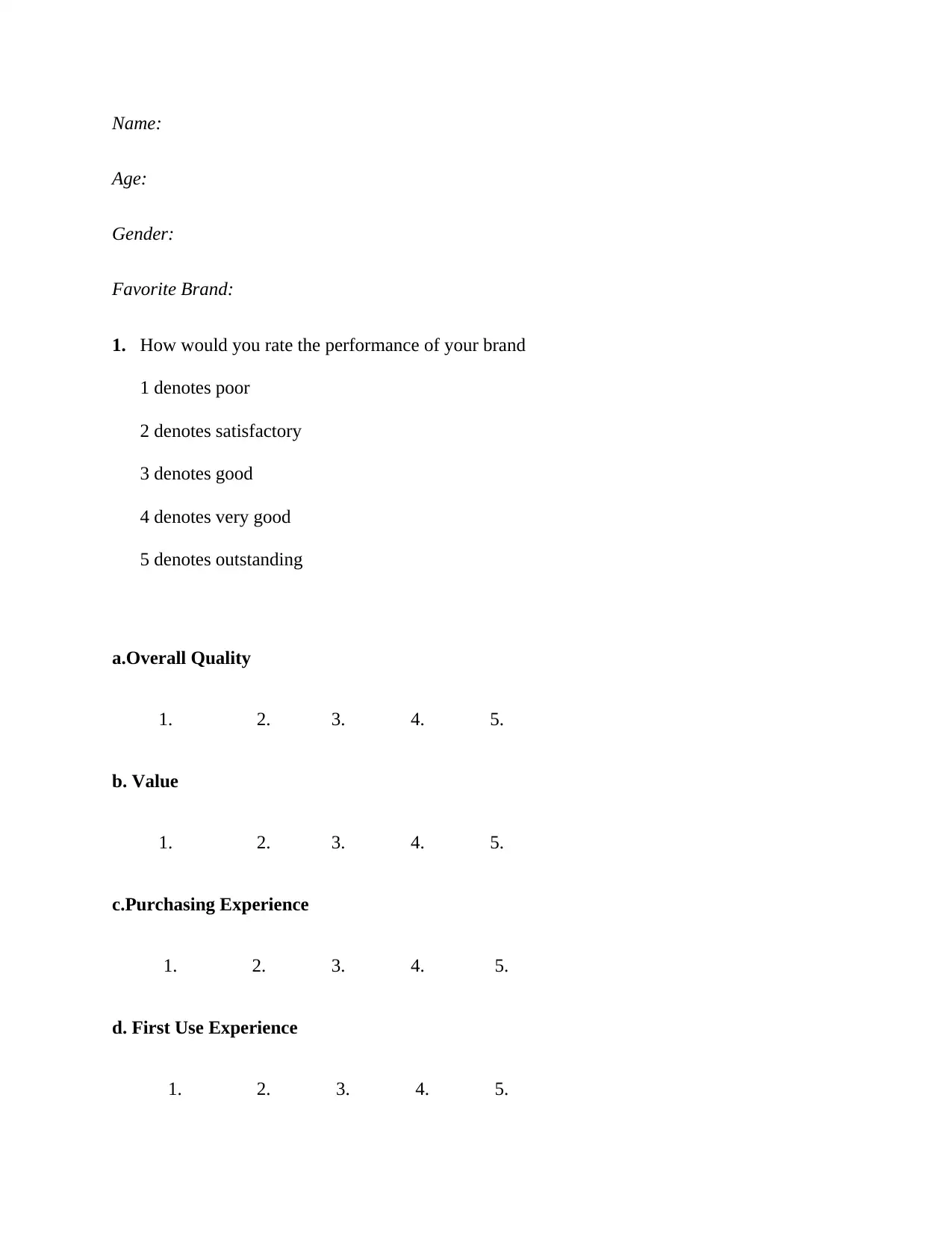
Name:
Age:
Gender:
Favorite Brand:
1. How would you rate the performance of your brand
1 denotes poor
2 denotes satisfactory
3 denotes good
4 denotes very good
5 denotes outstanding
a.Overall Quality
1. 2. 3. 4. 5.
b. Value
1. 2. 3. 4. 5.
c.Purchasing Experience
1. 2. 3. 4. 5.
d. First Use Experience
1. 2. 3. 4. 5.
Age:
Gender:
Favorite Brand:
1. How would you rate the performance of your brand
1 denotes poor
2 denotes satisfactory
3 denotes good
4 denotes very good
5 denotes outstanding
a.Overall Quality
1. 2. 3. 4. 5.
b. Value
1. 2. 3. 4. 5.
c.Purchasing Experience
1. 2. 3. 4. 5.
d. First Use Experience
1. 2. 3. 4. 5.
Paraphrase This Document
Need a fresh take? Get an instant paraphrase of this document with our AI Paraphraser
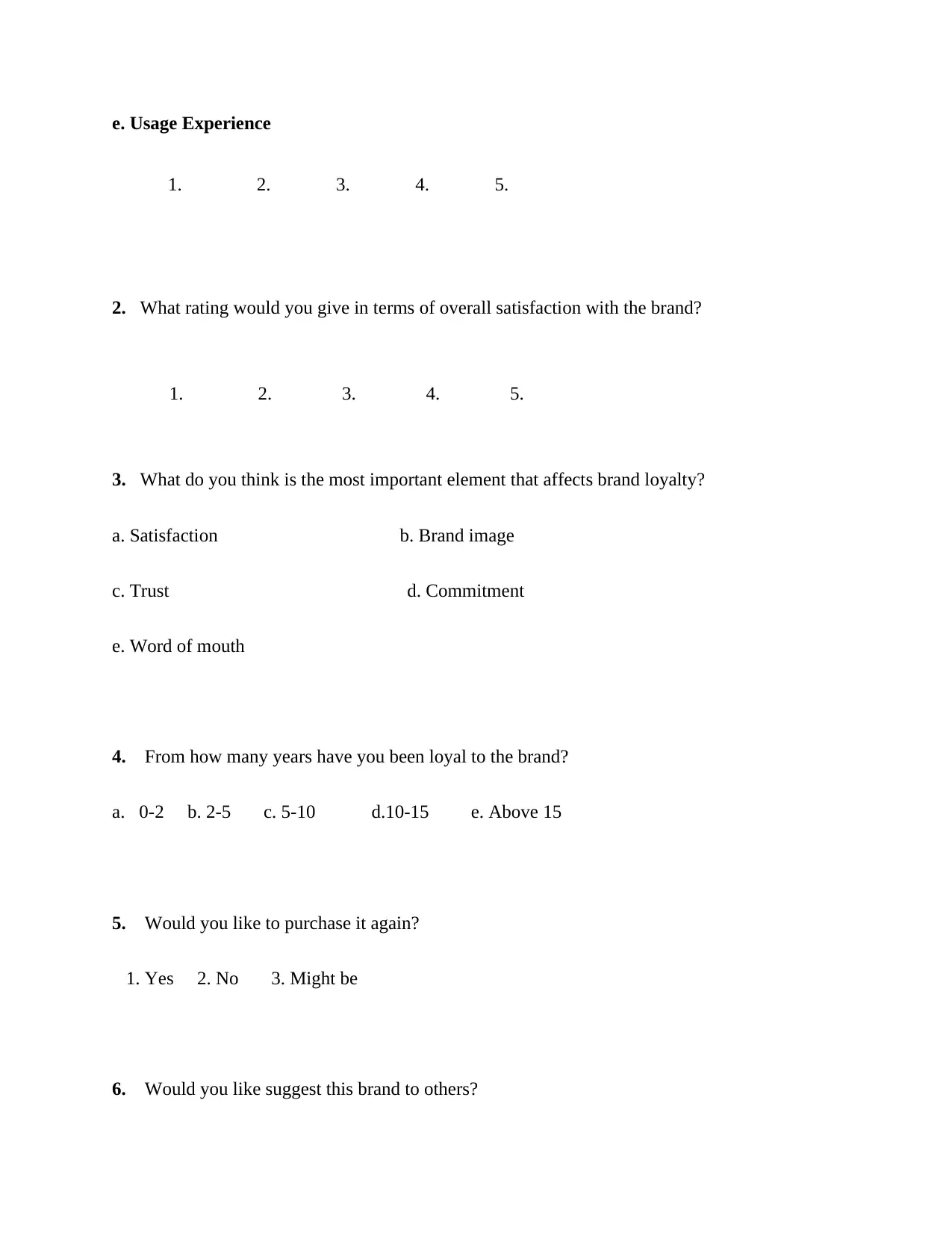
e. Usage Experience
1. 2. 3. 4. 5.
2. What rating would you give in terms of overall satisfaction with the brand?
1. 2. 3. 4. 5.
3. What do you think is the most important element that affects brand loyalty?
a. Satisfaction b. Brand image
c. Trust d. Commitment
e. Word of mouth
4. From how many years have you been loyal to the brand?
a. 0-2 b. 2-5 c. 5-10 d.10-15 e. Above 15
5. Would you like to purchase it again?
1. Yes 2. No 3. Might be
6. Would you like suggest this brand to others?
1. 2. 3. 4. 5.
2. What rating would you give in terms of overall satisfaction with the brand?
1. 2. 3. 4. 5.
3. What do you think is the most important element that affects brand loyalty?
a. Satisfaction b. Brand image
c. Trust d. Commitment
e. Word of mouth
4. From how many years have you been loyal to the brand?
a. 0-2 b. 2-5 c. 5-10 d.10-15 e. Above 15
5. Would you like to purchase it again?
1. Yes 2. No 3. Might be
6. Would you like suggest this brand to others?
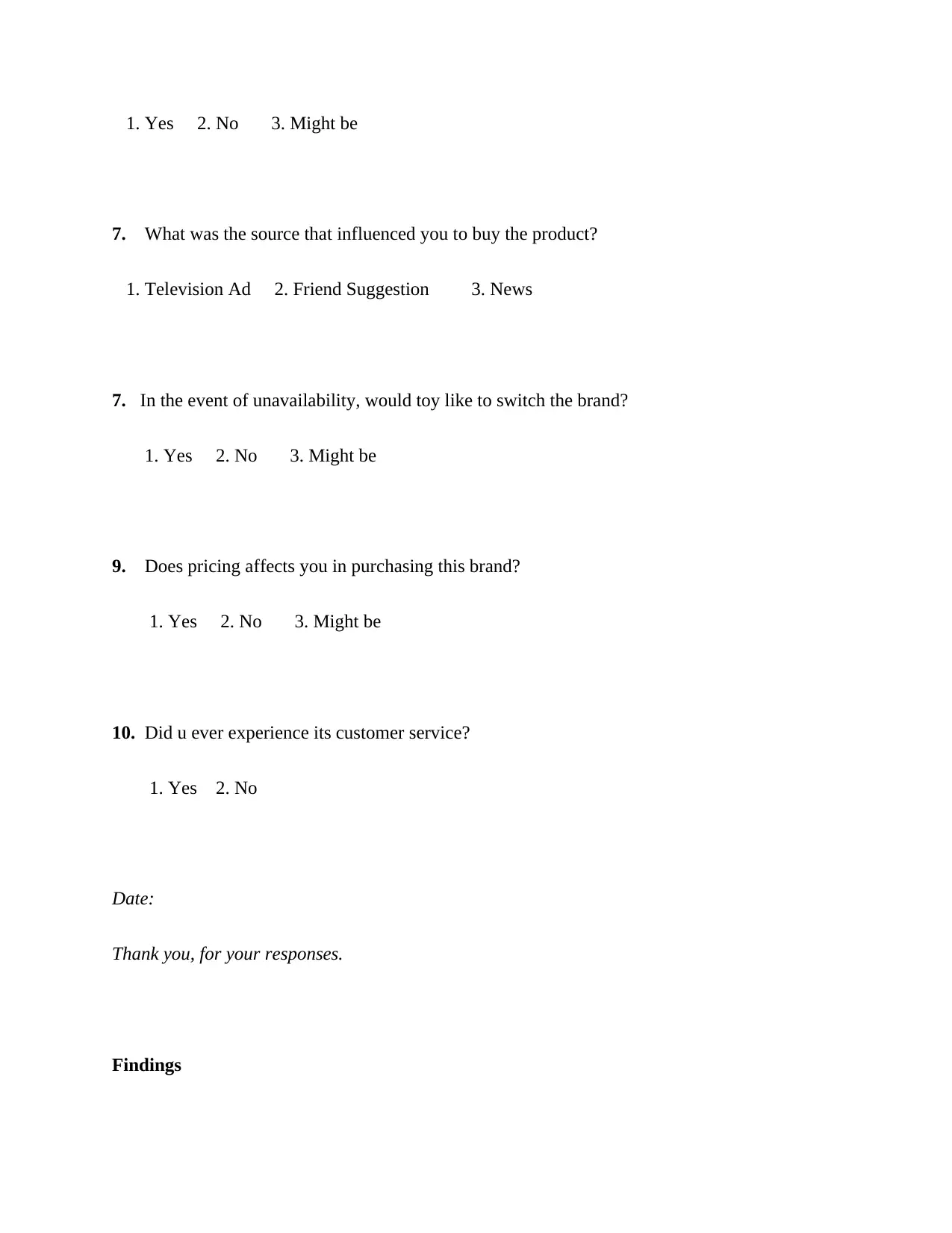
1. Yes 2. No 3. Might be
7. What was the source that influenced you to buy the product?
1. Television Ad 2. Friend Suggestion 3. News
7. In the event of unavailability, would toy like to switch the brand?
1. Yes 2. No 3. Might be
9. Does pricing affects you in purchasing this brand?
1. Yes 2. No 3. Might be
10. Did u ever experience its customer service?
1. Yes 2. No
Date:
Thank you, for your responses.
Findings
7. What was the source that influenced you to buy the product?
1. Television Ad 2. Friend Suggestion 3. News
7. In the event of unavailability, would toy like to switch the brand?
1. Yes 2. No 3. Might be
9. Does pricing affects you in purchasing this brand?
1. Yes 2. No 3. Might be
10. Did u ever experience its customer service?
1. Yes 2. No
Date:
Thank you, for your responses.
Findings
⊘ This is a preview!⊘
Do you want full access?
Subscribe today to unlock all pages.

Trusted by 1+ million students worldwide
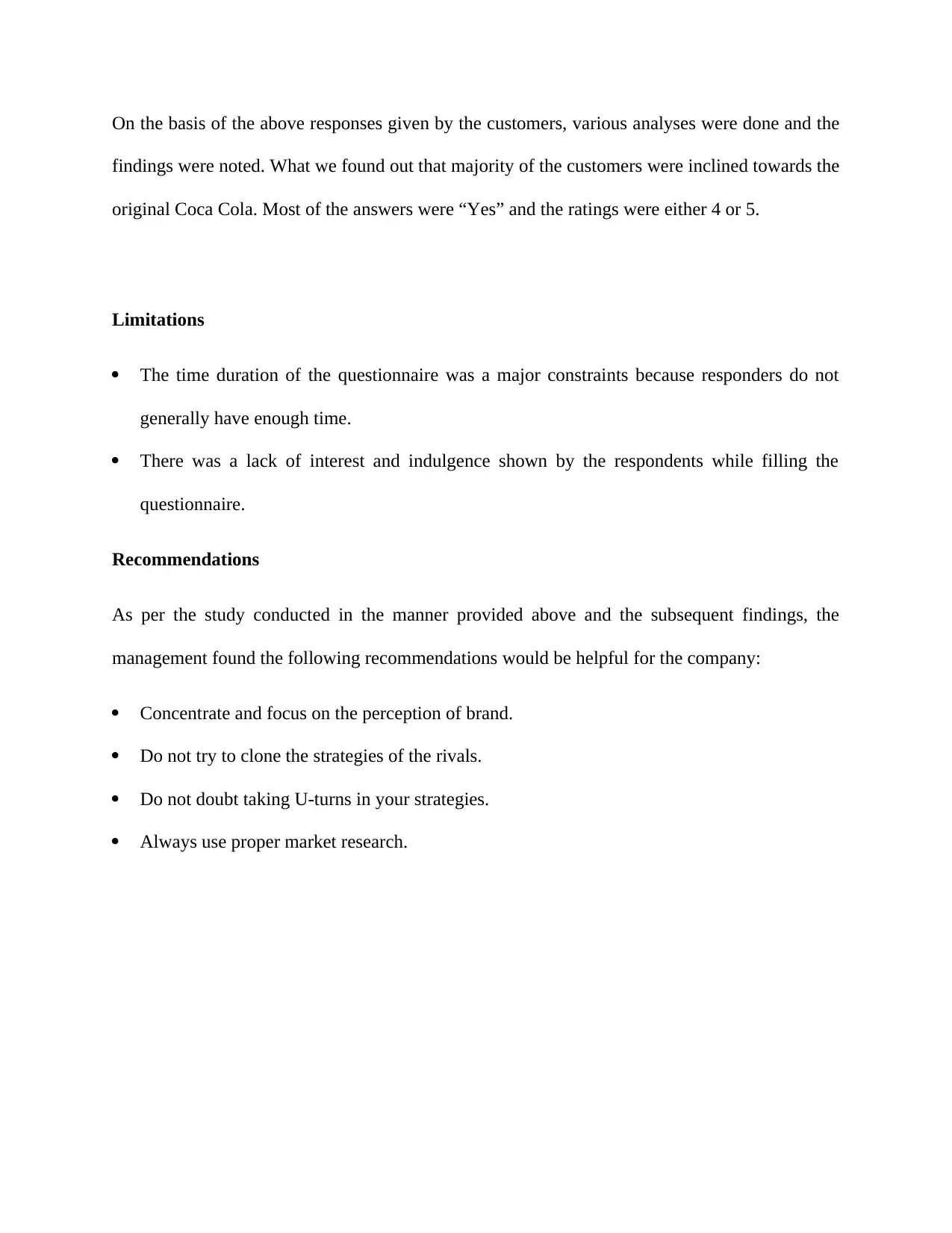
On the basis of the above responses given by the customers, various analyses were done and the
findings were noted. What we found out that majority of the customers were inclined towards the
original Coca Cola. Most of the answers were “Yes” and the ratings were either 4 or 5.
Limitations
The time duration of the questionnaire was a major constraints because responders do not
generally have enough time.
There was a lack of interest and indulgence shown by the respondents while filling the
questionnaire.
Recommendations
As per the study conducted in the manner provided above and the subsequent findings, the
management found the following recommendations would be helpful for the company:
Concentrate and focus on the perception of brand.
Do not try to clone the strategies of the rivals.
Do not doubt taking U-turns in your strategies.
Always use proper market research.
findings were noted. What we found out that majority of the customers were inclined towards the
original Coca Cola. Most of the answers were “Yes” and the ratings were either 4 or 5.
Limitations
The time duration of the questionnaire was a major constraints because responders do not
generally have enough time.
There was a lack of interest and indulgence shown by the respondents while filling the
questionnaire.
Recommendations
As per the study conducted in the manner provided above and the subsequent findings, the
management found the following recommendations would be helpful for the company:
Concentrate and focus on the perception of brand.
Do not try to clone the strategies of the rivals.
Do not doubt taking U-turns in your strategies.
Always use proper market research.
Paraphrase This Document
Need a fresh take? Get an instant paraphrase of this document with our AI Paraphraser
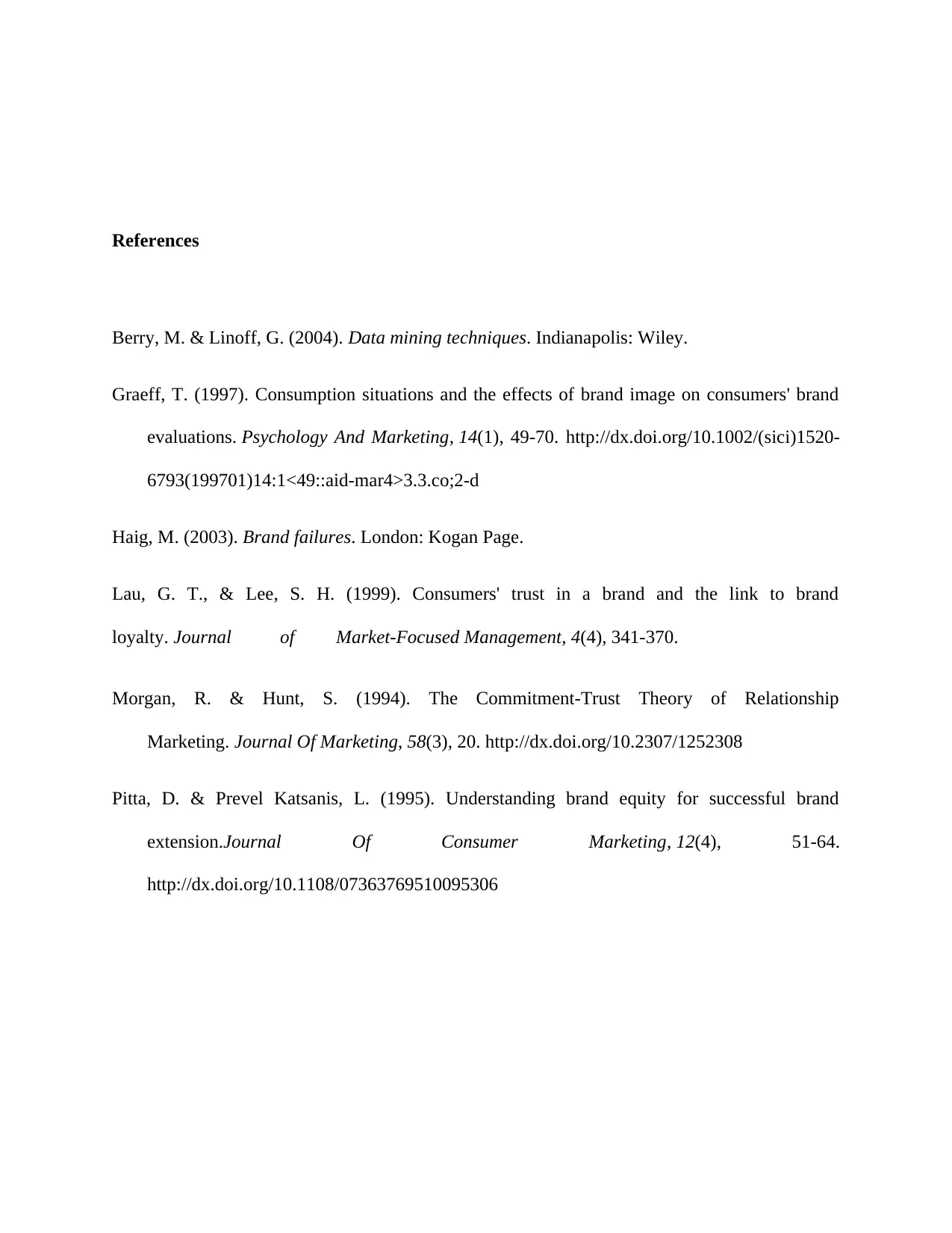
References
Berry, M. & Linoff, G. (2004). Data mining techniques. Indianapolis: Wiley.
Graeff, T. (1997). Consumption situations and the effects of brand image on consumers' brand
evaluations. Psychology And Marketing, 14(1), 49-70. http://dx.doi.org/10.1002/(sici)1520-
6793(199701)14:1<49::aid-mar4>3.3.co;2-d
Haig, M. (2003). Brand failures. London: Kogan Page.
Lau, G. T., & Lee, S. H. (1999). Consumers' trust in a brand and the link to brand
loyalty. Journal of Market-Focused Management, 4(4), 341-370.
Morgan, R. & Hunt, S. (1994). The Commitment-Trust Theory of Relationship
Marketing. Journal Of Marketing, 58(3), 20. http://dx.doi.org/10.2307/1252308
Pitta, D. & Prevel Katsanis, L. (1995). Understanding brand equity for successful brand
extension.Journal Of Consumer Marketing, 12(4), 51-64.
http://dx.doi.org/10.1108/07363769510095306
Berry, M. & Linoff, G. (2004). Data mining techniques. Indianapolis: Wiley.
Graeff, T. (1997). Consumption situations and the effects of brand image on consumers' brand
evaluations. Psychology And Marketing, 14(1), 49-70. http://dx.doi.org/10.1002/(sici)1520-
6793(199701)14:1<49::aid-mar4>3.3.co;2-d
Haig, M. (2003). Brand failures. London: Kogan Page.
Lau, G. T., & Lee, S. H. (1999). Consumers' trust in a brand and the link to brand
loyalty. Journal of Market-Focused Management, 4(4), 341-370.
Morgan, R. & Hunt, S. (1994). The Commitment-Trust Theory of Relationship
Marketing. Journal Of Marketing, 58(3), 20. http://dx.doi.org/10.2307/1252308
Pitta, D. & Prevel Katsanis, L. (1995). Understanding brand equity for successful brand
extension.Journal Of Consumer Marketing, 12(4), 51-64.
http://dx.doi.org/10.1108/07363769510095306

⊘ This is a preview!⊘
Do you want full access?
Subscribe today to unlock all pages.

Trusted by 1+ million students worldwide
1 out of 12
Related Documents
Your All-in-One AI-Powered Toolkit for Academic Success.
+13062052269
info@desklib.com
Available 24*7 on WhatsApp / Email
![[object Object]](/_next/static/media/star-bottom.7253800d.svg)
Unlock your academic potential
Copyright © 2020–2026 A2Z Services. All Rights Reserved. Developed and managed by ZUCOL.





